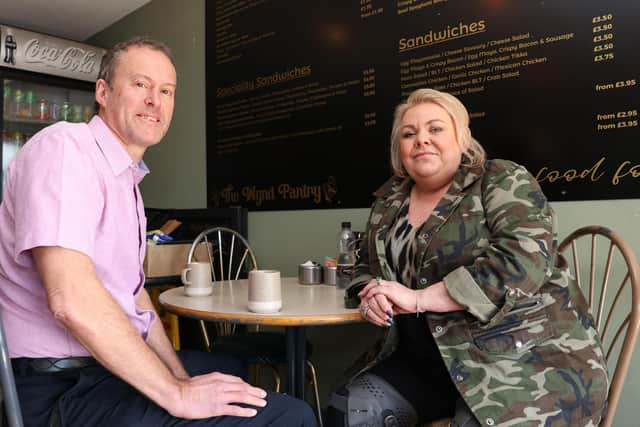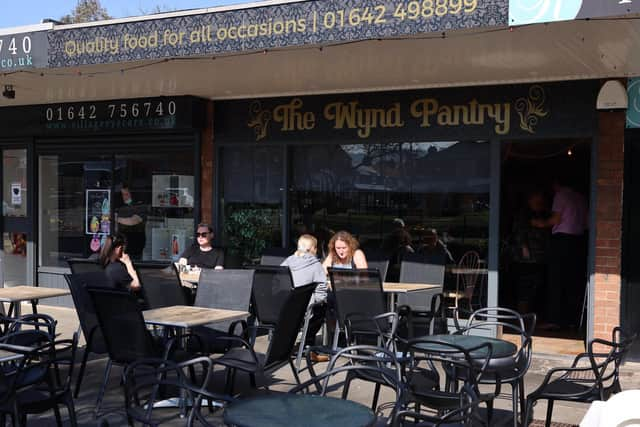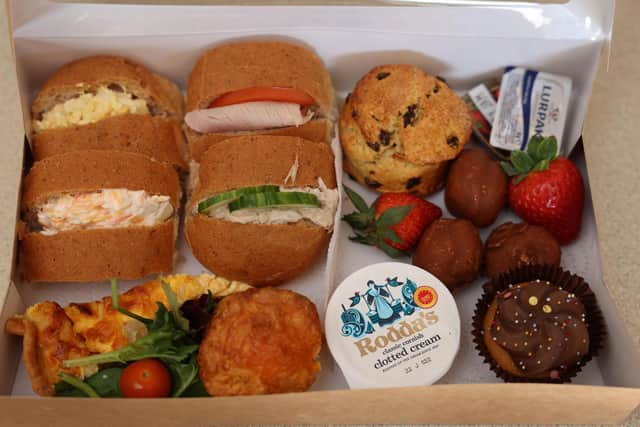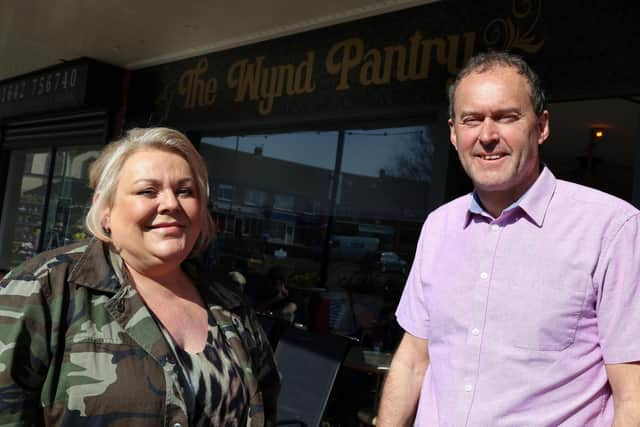Covid-19 grants: How a family-run business survived Covid-19 - and the council fixer who helped them
While emergency funding was provided by the Government to keep companies afloat during periods when lockdowns and other restrictions were in place, other grants focused on restart and recovery.
There were also additional discretionary funds intended to help businesses starting up in the wake of the virus outbreak and those seeking to grow or adapt in a changed post-covid environment.
Advertisement
Hide AdAdvertisement
Hide AdBut what of the human faces behind the bare statistics – the business owners themselves – and equally the council staff at the sharp end, ensuring the money was paid out as fast and as fairly as possible?


“It was a massive shock for everybody”, says Janette ‘Netty’ Kennedy, who runs The Wynd Pantry in Marske, east Cleveland, which employs seven staff and started as a family-run business about 20 years ago.
The 51-year-old is talking about when the first Covid-19 lockdown was imposed and the café, which does everything from snacks to Sunday lunches to Christmas dinners, had to close.
“We’d bought all our stock, had our vegetables ordered in for the week, and boxed it all up, handing it out to staff and friends and family.” she said.


Advertisement
Hide AdAdvertisement
Hide Ad“We had a lot of stuff that was perishable and sent it out to places that were still open, essential places, the doctor’s surgery, the pharmacy, the post office, Sainsbury’s.
“We also got a big Union Jack love heart thing for the main window and put on it ‘Everyone stay home, take care’, that sort of thing. Then it was like ‘God what are we going to do next?’”
Support
Miss Kennedy says she was made aware of grants being made available by the council, but at first struggled with the application process which was online as she’s “so bad with technology”.


She subsequently received help from David Hitchen, from the council’s business engagement team, who she describes as “fantastic” and who enabled The Wynd Pantry to access financial support.
Advertisement
Hide AdAdvertisement
Hide AdThe café had been closed for several weeks before Miss Kennedy hit on the idea of afternoon teas – sandwiches, quiches, cakes, scones – for delivery, advertising it on Facebook.
“You can only keep things for so long in a fridge or freezer, and we thought we could prepare teas for people that might want them,” she said. “Nobody was going out anywhere or doing anything and the weather was nice so everyone was having afternoon tea in the garden.
“I took one girl off furlough because she needed the money and me and her and my mum did the teas together, with my son helping to do the deliveries.


“It was originally just weekends, but people kept ringing up saying they’d had them and wanted them again, or seen them advertised, so we started doing them four days a week and took some more staff off furlough.
Advertisement
Hide AdAdvertisement
Hide Ad“People would order and pay over the phone, we’d deliver it, knock on the door and leave it on the doorstep for them all bagged up. We weren’t taking anywhere as much money compared to when we were open properly seven days a week, but it was a way to start doing things again.”
Miss Kennedy added: “The money helped with the bills and restocking – the first grant that we got was £10,000 – and on the days we didn’t have money coming in we knew we still had enough to pay the staff.
“If it had not been for the grant support the business would have definitely gone under and we would not have survived.”
Omicron strikes
Things had settled down again until the omicron variant began to take hold towards the end of last year.
Advertisement
Hide AdAdvertisement
Hide Ad“From December people were cancelling parties, meals they’d booked and the takings massively dropped, and it all went a bit wonky-donkey again,” says Miss Kennedy.
The business benefited again from the omicron hospitality and leisure grant fund, introduced by the Government in December and administered by the council, which has so far had more than 500 applications.
“It was massively helpful. Things had got really difficult, and we had staff no longer on furlough who wanted their hours, and it enabled me to ensure I had enough money to pay their wages,” she says.
Miss Kennedy is optimistic about the future and believes the business will get back to pre-Covid levels of trading, although she has cause to worry now about rising costs with her electric bill having doubled recently from £350 to about £750.
Advertisement
Hide AdAdvertisement
Hide Ad“Trade has definitely picked up, we had some really good days this week,” she says. “And we still do the afternoon teas, we have some booked in for takeaway for the Mother’s Day weekend.”
Miss Kennedy added: “I would imagine some people have done extremely well out of covid and others have struggled and have lost their business. We’ve been lucky. I have seven members of staff who all have families, who are dependent on me.
“It is a case of trying to keep everybody in a job and just take every day as it comes, being happy and trying to look after our little village community. I’m never going to be a millionaire and it’s not about the money, I give too much away – if I’ve got it you can have it.”
The fixer
Mr Hitchen, who has been with the council for 14 years and assisted The Wynd Pantry, says he has been described as a “fixer”.
Advertisement
Hide AdAdvertisement
Hide Ad“There is an awful lot of support out there for businesses, but the owners themselves are often too engrossed in the day to day to know what there is,” he says.
“Our role is to help businesses understand what issues they have and try to come up with solutions, that can be explaining marketing strategies or basic business plans.
“I ask people what problems they have that are stopping them from achieving their goals, it can then be as simple as pointing them in the right direction or helping them more in-depth.
“I have almost 40 years working with businesses and I have seen the good, the bad and the downright ugly.
Advertisement
Hide AdAdvertisement
Hide Ad“Whether it’s the multi-nationals coming into Teesworks or Wilton, or the start-up painter and decorator or beautician, who have got all the qualifications but don’t really know how to go about setting a businesses and all the different skills they need to be successful, they are all in the mix.”
Seven days a week
Mr Hitchen says the team he works with receives word of mouth referrals, but will also approach businesses directly.
“With covid all of a sudden we were right at the epicentre and everyone had to come to us,” he said.
“It totally took my job over. We knew there would be a lot of work involved in delivering the covid grants. The day job did not quite grind to a halt, all through the period there have still been businesses wanting to grow and meriting support, but we had to become more reactive than proactive.”
Advertisement
Hide AdAdvertisement
Hide AdMr Hitchen says at the height of the virus outbreak staff were working nine or ten hours a day to deliver grant funding on behalf of the Government.
“We had to comply with their requirements, which sometimes were a bit fuzzy, and there was a lot of misinformation out there, and we spent a lot of time having hard conversations with people to explain whether or not they were eligible for funding, and if they weren’t why that was the case,” he said.
“There were phone calls seven days a week.
“You’d be out on a Sunday morning and your phone would go and the people on the other end were often in a desperate state who were just trying to make contact and get clarification on what funding was available to assist them. It really did take over our lives.”
No deadlines
Mr Hitchen said there were no deadlines being worked to with council staff working as fast as they could to sign money off.
Advertisement
Hide AdAdvertisement
Hide Ad“We all knew how difficult it was for many of the local businesses to survive,” he added.
Workers from different parts of the council were drafted in to help with the administration of it all.
“The amount of checking that was required from an audit perspective was quite substantial and we are still going through that process,” said Mr Hitchen. “We had six of our team involved, but we were also pulling people in with admin skills and who were able to interpret the information.
“In most cases business owners had an awful lot of questions that they could not always find the answers to on Government websites, they needed hand holding, with some unable to actually complete the online applications.
Advertisement
Hide AdAdvertisement
Hide Ad“It was a team effort throughout with any number of different departments within the council involved.”
Organised crime
When asked about the potential for fraud, Mr Hitchen says staff in the first instance were looking to make sure businesses were genuine and trading.
“That can be through a bank statement, or checking up on business rates records,” he said. “We went through three or four different stages. We are fortunate that quite a few of our team live locally and were able to use their personal knowledge.
“Organised crime was known to be involved with some of these schemes, but by the same token you also had local people who were clearly trying it on, people who were stating their business had been adversely affected when they weren’t even trading.
Advertisement
Hide AdAdvertisement
Hide Ad“It was disappointing to consider the greed of some people. Some applications were borderline, but others were blatant attempts to grab as much money as they could.
“Certain individuals who didn’t need the money were the ones screaming the loudest when we knew of other businesses who weren’t as vocal who needed it more, and in some instances did not get anything at all – there was a degree of unfairness about it all.
“You had to concentrate on the thanks from businesses who did merit money and got it, rather than letting the shysters upset you.”
Resilience
Despite the massive impact of covid, Mr Hitchen says from talking to colleagues he does not believe there has been a significant drop-off in terms of new business start-ups in Redcar and Cleveland.
Advertisement
Hide AdAdvertisement
Hide Ad“The number of enquiries we are getting from people looking to become self-employment is as high as we’ve known it,” he says.
The 57-year-old says he has been able to help business owners who felt they were in danger of losing everything they’d worked for.
“We had people breaking down in tears,” he said. “Being self-employed in particular can be very lonely and our team was maybe the only people who could understand what people were going through and hopefully help them access the grant funding they needed.
“It may sound dramatic, but people’s mental health can suffer in some instances and you were saving relationships and maybe lives.
Advertisement
Hide AdAdvertisement
Hide Ad“When you can go round now and see businesses that had been struggling that are still operational and have survived the pandemic it is quite an achievement. In a lot of cases they have been able to improve their offering and are coming out stronger and more resilient.
“When you see what’s coming onto the likes of Teesworks and Wilton, large scale projects, the area is on the cusp of being successful and a lot of these little businesses will be able to benefit going forward.”
